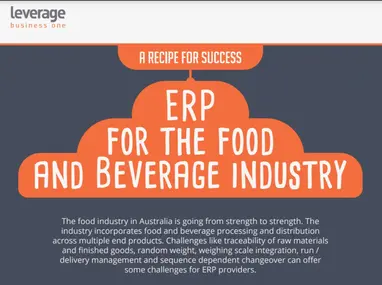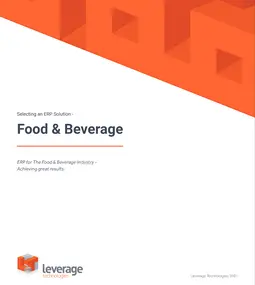One tailored solution for food processing & distribution
The food and beverage industry in Australia is growing at a rapid rate as we continue to build food processing plants, distribution facilities and retail outlets to feed a growing local and global population. The food industry faces several challenges associated with supply chain management across retail, distribution and processing, regulatory requirements and price pressure.

As the industry grows there is increasing demand on the food and beverage industry players to deliver in several different areas:
Stay Ahead with ERP for Food and Beverage Businesses
These multiple touchpoints can provide opportunity or pain for any food and beverage supplier – in food processing and/or food and beverage distribution. By using the best food and beverage ERP software, you can stay ahead of the competition by:
Leverage Technologies has successfully been helping food and beverage customers across Australia run their business more efficiently with modern food ERP systems.
Food and Beverage Industry Pain Points
Any business considering ERP for food processing industry will usually have a reason or a number of reasons for going to market for ERP. These “reasons for going to market” are considered “pain points”. Let’s explore these pain points in more detail as they relate to the food and beverage industry. Let’s also discuss how ERP for food and beverage can address these challenges.
Whilst we will focus on the operational aspects of ERP for food processing industry it is worth noting that you should implement a complete business management (ERP) solution. This means that your food and beverage ERP solution should offer all the functionality that a customer might require:
- Financials – including financial and tax reporting
- Supplier and raw materials management
- Sales
- Manufacturing (including manufacturing planning / scheduling)/li>
- Food industry specific requirements
- Proof of delivery
- Purchasing and purchase planning
- CRM (Customer Relationship Management)
- Inventory control and warehouse management
- Mobility (get the information that you want, when you want it)
- Reporting, analytics, business intelligence and dashboards
A recipe for success
”We would definitely recommend Leverage Technologies to any other business looking at implementing a new ERP system.
Chris ColeMarkris Foods, Business Development Manager
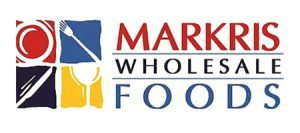
Typical food and beverage pain points that need to be addressed:
HACCP requirements
HACCP Australia looks to provide the world’s best standards and practice for the food and beverage industry. HACCP helps identify and manage risk in food safety through programs, education and solutions. A Food and Beverage processing or distribution company in Australia will be required to be HACCP certified. This is where there is a major requirement from the ERP solution provider to give assistance with reporting and solutions to manage HACCP requirements. These requirements will include:
- Traceability
- Expiry dates
- Recall protocols
- Ensuring compliance
Traceability
We touched on this requirement when we mentioned HACCP (above). The requirement for traceability in the food and beverage industry usually relies on full batch/lot traceability. This includes traceability of raw materials and finished product.
POD (Proof of Delivery)
If you are processing or distributing food and beverage products you will, without doubt, be delivering the end product to customers. Very often these customers are broken into two broad categories – large retail (requires EDI) and smaller cafes, restaurants and specialist stores (require electronic POD). The pain point here is that multiple pieces of paper floating about in a truck or an old book with signatures scribbled on the paper-based POD is not what you are looking for. Go with an electronic POD integrated into your ERP solution for fast, efficient proof of delivery.
Allergens
Compliance is key in Australia and requires the declaration of certain substances and products on-package labelling.
Random weight/catch weight
The actual weight of the finished item is variable. An item might be sold as a carton and a carton could weigh anything from 2KGs to 2.1KGS – producing a variable weight per carton sold.
Quality control
At the heart of every stock movement in the food and beverage industry is the requirement for quality management. This includes checking batches of raw materials as they arrive into the warehouse and completing sample checking of finished goods before they are shipped.
EDI (Electronic Data Interchange)
If you are trading with the major retailers in Australia, you will require EDI integration. This EDI integration will be used to automate the selling and fulfilment process. EDI will include document flows to and from your ERP solution (PO’s, ASNs etc.). An integrated EDI solution will provide a seamless workflow between the retailer and your business.
Product recall
As part of your HACCP accreditation, you will be required to show that, in the unlikely event of a product recall your ERP solution can provide backwards and forwards traceability. This will be required to show not only which products are directly involved in a product recall but what other items might be affected. For example, what raw materials might have caused the issue and where else where these raw materials used?
Weighing scale
Food products are somewhat unique in that they can be sold in packs and by weight. This can cause a major headache for ERP providers. Weighing scale integration becomes important for managing and checking raw material quantities used in recipes and finished goods about to be shipped. Weighing scale integration to ERP provides another checkpoint to ensure accuracy.
PLM (Product Lifecycle Management)
Another aspect of regulation requires product lifecycle management in the food industry to monitor changes in a bill of materials or recipe. Think of the challenges associated with labelling all ingredients, allergens and composition of products.
Sequence dependent changeover
Another food industry requirement for processing/manufacturing whereby you need to process manufacturing in a particular order to minimise clean and set-up times on each manufacturing workstation. For example, if you manufacture yogurt you might need to process your planning in a particular order – vanilla before strawberry to avoid additional cleaning and machine set-up times.
Leverage Technologies ERP solution for food processing industry:
SAP Cloud ERP
Next-generation cloud ERP for midsize and global enterprises. Powerful data, deep analytics, and real-time performance across industries.
SAP Business One
A powerful, scalable ERP for SMEs and multinationals. Cloud or on-prem. Fast, flexible, and built for data, logistics, and growth.
Sage X3
An advanced ERP Solution for complex, multi-entity operations. Built for scale, compliance, and global supply chains—cloud or on-premise.
MYOB Acumatica
A modern cloud ERP for growing ANZ businesses. Real-time visibility, custom dashboards, and full control—built to scale with ease.
Wholesale food distribution company runs fast with SAP Business One
Recognised by the top ERP Partners in Australia
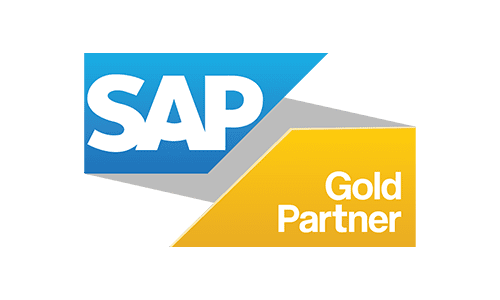
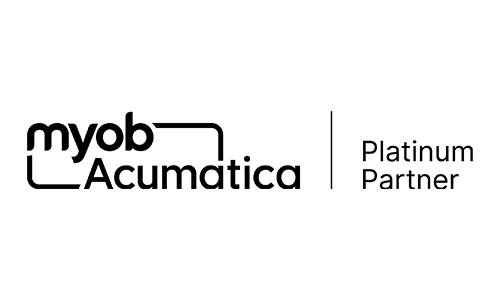

Leverage Technologies is an SAP Business One and SAP Cloud ERP Gold Partner, a Sage Platinum Partner and an MYOB Acumatica Platinum Partner. Our team has won some of the most prestigious national awards as proof of our commitment to customer success.
Leverage Technologies partners with the best ERP solution providers in the world to deliver value and business benefits for our customers. In recognition of this, the team at Leverage has won over 16 partner industry awards for excellence in the ERP industry.
Interested in finding out more about SAP, Sage and MYOB ERP for food processing industry?
Please give us permission to contact you by completing the “Contact us” form and the friendly team at Leverage Technologies will give you a call to discuss your requirements – EDI, WMS, HACCP, transport management, inventory control, business intelligence and more.










